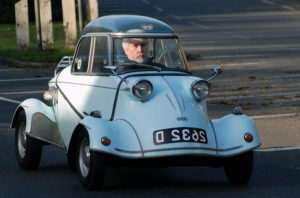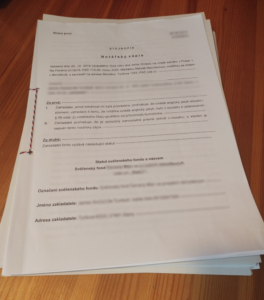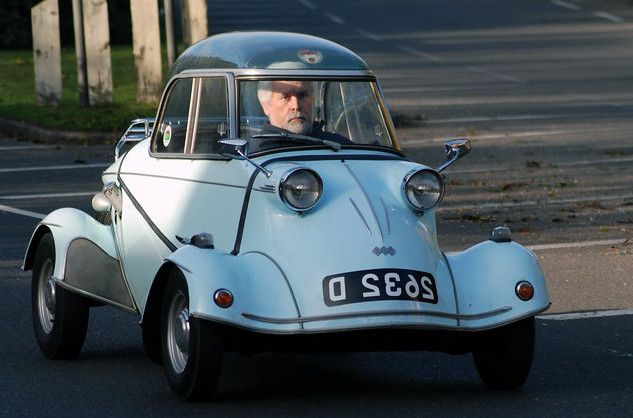For most families, establishing a trust is an important decision. Quite a lot of money can be involved, and you will be stuck with the results of your decision for a long time. In this way, trusts are like cars. Buying a car is also a relatively big decision and you are also have to live with the results of your decision.
But that is where the similarity ends.
You can see a car and you can touch it
When you go shopping for a car, you can look at the car in the showroom, you can sit in it, and you can feel the quality of the interior. You can close the door and listen to hear if you get a “clunk” or a “clink”. Looking at the car, even before you take it for a test drive, you can form some opinions about whether you like it and whether it is the right car for your family. Is it big enough? Is it too big? Is it strong enough? Is it comfortable enough? Is it practical?
Sometimes it is easy to recognise that a particular model is not suitable for you.

Caption: This one is very economical but not the ideal family car
In contrast, all trusts look like this:

The good ones look like this, the bad ones, the deluxe ones and even the ones that don’t work at all, they all look like this.
The price of cars correlates (at least to some extent) to their quality
People understand that as a general rule, better cars are more expensive. Thus, a Skoda Superb costs more than an Octavia, which in turn costs more than a Fabia.
Based on my experience, this rule doesn’t apply to trusts. It is true that a very ‘cheap’ trust is more likely to be a bad one but spending a lot of money is also no guarantee of quality. Some of the worst trusts I have seen have also been some of the most expensive.
Most people understand at least something about cars.
You don’t have to be a mechanic or a motoring expert to recognise some basic issues that a car might have. For example, if your car is missing wheels, or some other fundamental part which will prevent it from working, you won’t buy it. If the car has bad rust it might fall apart. You can see that and so you won’t buy the car. And if your car isn’t working, then you know it isn’t.
Sadly there are many people out there who have trusts that simply don’t work. They are missing the legal equivalent of wheels, brakes, or steering. But because of the nature of trusts those same people don’t even realise that they have a problem, and by the time they do realise, it is too late.
Some of these ‘bad trusts’ are so bad that they are far worse than having no trust at all.
You can take a car for a test drive
With a car, you can try before you buy. With a trust there is no way of doing that. As I said above the only real way to ‘road test’ your trust is to wait for something to go wrong and then see what happens. But of course, by then, it’s too late!
Optional Extras cost more.
With a car, there is a base price. For example here is the entry-level Skoda Octavia:

With most new cars it is possible to add ‘optional extras’ for some additional cost.
This Octavia includes a lot of features that are not optional at all (wheels, seats, steering, brakes, windows etc). But the standard model also includes quite a few things that are not really essential, but nice to have. For example, air conditioning, cruise control, and central locking. Skoda considers these as standard features, which are included automatically in the price: 519,000 CZK (21,000 EUR).
But if you want, you can play with the configurator on the Skoda website and add a few optional features. I did that. I chose a different engine, metallic paint, a towbar, heated seats and so on. In no time my price increased to 731,000 CZK (29,600 EUR).

Do I really need these extras? Perhaps I don’t. But even so, they would all certainly be nice to have.
For example, I don’t plan to tow a trailer, but who knows? One day, having a towbar might be useful. On the other hand, is it worth the extra 25,000 CZK (1,000 EUR) for something I might never use? Perhaps not.
Trusts are a bit different.
For example, your trust documents could include the possibility for you to make changes to your trust, the ability for the trustees to borrow money or to own cybercurrency. They could include the possibility for you to appoint a supervisor. They could include the possibility for you to relocate the trust to a different country.
Many people really don’t need these extra things just as I don’t really need a towbar. It is very important to point out that you cannot do these things unless your trust has clauses that allow them – just as I cannot tow a trailer if I don’t have a towbar.
But unlike the towbar, the ‘optional extras’ for your trust are normally free. They are not pieces of metal but rather (standard) words printed on paper. It may be that you have no plan to buy bitcoin or appoint a supervisor, just as I have no plan to tow a trailer. But because there is no additional cost, the basic starting point for good trust should always include:
- The basic things (wheels, brakes)
- The non-optional extras (air conditioning), AND
- The optional extras (a towbar) that you will probably never use, but might one day
Of course once you start to ask for truly unique features (a jacuzzi built into the back seat, machine gun mounts) then those things will need to be tailor-made for you, and that will, of course, cost more. Likewise, if your trust is not standard (not a car at all but rather a bus, a truck, or a tank) then different rules will apply.
But I see too many people paying the deluxe price for a basic car, and sometimes they don’t even get all the essential standard features – let alone the full set of optional extras.
Goodness! This is complicated. What should I do?
We have some simple tips to help you avoid these pitfalls:
- NEVER try to make a trust without professional help. This is an almost certain recipe for disaster
- Make sure the professional who is helping you knows what he or she is doing. In many countries you can find plenty of so-called and self-proclaimed ‘trust experts’. Many of these people are not experts at all. For example in the Czech Republic, I estimate that there are around 10-15 people who are truly experts in this area. Did you strike it lucky? Probably not.
- Count the pages. Optional extras take up space. If your total package of documents (Statute and contract) is less than 20 pages, it will be missing important things
- If you are not 100% sure your expert really is an expert then get a second opinion before you sign anything. This won’t be free, but can potentially repay the cost many times over
- Find out the standard price for a trust in your jurisdiction. For example, in the Czech Republic, most trusts cost less than 100,000 CZK (4,000 EUR). If you are paying more then you are probably paying too much. Of course, if your trust is non-standard, then the costs will be (and should be) higher.
If you would like a second opinion of your proposed or existing trust, please contact me. Together with truly experienced legal experts I can make sure your trust includes all the optional extras and is really delivering value for money.
